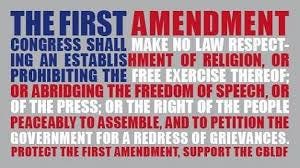Photographers Association letter demands White House protect photographers 1st. Amend. rights.

Despite the prompt apology issued by the Vice President's press office to the University of Maryland journalism school for deleting the photographs of a journalism student covering an event with Joe Biden earlier this week, the White House News Photographers Association fired off an admonishing letter Thursday to the press office and sought a meeting to ensure that it does “not ever happen again.”
“While we commend your office for immediately apologizing to the reporter . . . we do not believe that such a blatant violation of free press/speech rights protected under the First Amendment should pass without comment,” wrote Ronald Sachs, who heads the photographers association. The letter was also written on behalf of the National Press Photographers Association and the Reporters Committee for Freedom of the Press.
On Wednesday, Capital News Service reporter Jeremy Barr -- wearing his congressional press credential -- was covering Biden's announcement of a new domestic violence initiative in Rockville, Md., when a staffer directed him to a non-press area. After the event, another staffer questioned Barr and demanded to see his camera. The staffer said Barr's location gave him an "unfair advantage" over other journalists covering the event and forced the journalism student to delete the photographs in front of her. The staffer also asked Barr to show her his iPhone to make sure he did not take photographs on it. Barr was then detained by the staffer for about 10 minutes while she contacted her supervisor before finally permitting Barr to leave, according to Capital News Service, which is run by the University of Maryland Philip Merrill College of Journalism.
Lucy A. Dalglish, the college's dean, filed a formal complaint with the Vice President's press office immediately and said the staff member violated the Privacy Protection Act. (Dalglish is a former executive director of the Reporters Committee.)
"This statute makes clear that it is the policy of the U.S. government to provide special protections for the press against searches and seizures by law enforcement and other government officials . . . Rockville is not a third-world country where police-state style media censorship is expected. I request an immediate apology to our reporter, Jeremy Barr, and to the editors and staff of Capital News Service. I also request that your staff be trained in basic First Amendment rights of citizens and media to ensure such tactics are not employed in the future," Dalglish wrote.
http://www.rcfp.org/browse-media-law-resources/news/photographers-associations-admonish-bidens-office-ordering-deletion-
ACLU sued state lawyer for prosecuting cases in violation of 1st. Amend.
Chicago, IL - In 2012, Illinois saw a rash of cases involving the Illinois Eavesdropping Act, which forbade making audio or visual recordings of people without explicit consent from everyone in the recording. In practice, the law made recording on-duty police officers a felony in the state. The prosecutions of citizens that ensued prompted the ACLU to challenge the state's Eavesdropping Act, and it was eventually ruled unconstitutional on First Amendment grounds in the US Seventh Circuit Court of Appeals. In November 2012, the US Supreme Court denied a request from a Chicago-based prosecutor to review the Seventh Circuit’s decision, letting it stand.
That victory for defendants who were charged with violating the Act has helped the ACLU in similar cases. In 2010, the group brought a case against Cook County State's Attorney Anita Alvarez, who had been prosecuting ACLU staff members for recording on-duty police officers. The Northern Illinois District Court judge overseeing the case ruled that in light of the higher courts' decisions, Alvarez may not charge anyone else with violating the Eavesdropping Act. And now this month, the judge ruled that Cook County taxpayers must foot the $645,549 legal bill the ACLU racked up prosecuting the county's state prosecutor. The payment of that penalty will be finalized at a Cook County board meeting on Wednesday of next week, according to the Chicago Sun-Times.
“The Illinois Eavesdropping Act... violates the First Amendment of the United States Constitution as applied to the open audio recording of the audible communications of law enforcement officers (or others whose communications are incidentally captured) when the officers are engaged in their official duties in public places,” a January ruling [PDF] by Judge Sharon Johnson Coleman read. “Defendant Anita Alvarez, in her official capacity as Cook County State’s Attorney, is permanently enjoined from enforcing the Illinois Eavesdropping Act against the American Civil Liberties Union of Illinois and its employees or agents who openly audio record the audible communications of law enforcement officers (or others whose communications are incidentally captured) when the officers are engaged in their official duties in public places.”
In March of 2012, an Illinois judge ruled that the Eavesdropping Law was unconstitutional in a case involving 60-year old artist Christopher Drew, who was charged with a Class 1 felony for recording audio of his interaction with police. (Drew died of lung cancer in May.) In a similar case, Indiana woman Tiawanda Moore was acquitted in 2011 of eavesdropping when she made a recording of police officers who were trying to get her to drop a sexual harassment complaint.http://arstechnica.com/tech-policy/2013/03/illinois-county-to-pay-aclu-600k-after-eavesdropping-law-voided-by-high-court/


